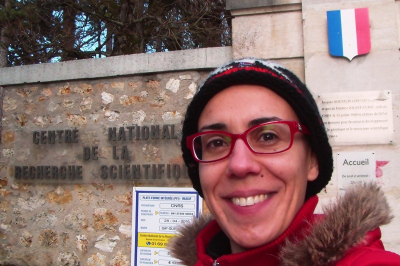Die Inhalte dieser Seite sind leider nicht auf Deutsch verfügbar.
Seitenpfad:
Lélia Matos
Report of GLOMAR PhD student Lélia Matos about her research stay at LSCE – Laboratoire des Sciences du Climat et l'Environnement, Gif-sur-Yvette, France from 23 January – 3 February 2012
As part of my Ph.D. project on the temporal distribution of cold-water corals in the North Atlantic, I need to date fossil coral fragments from the sea floor. That is done by means of mass spectrometric U-series dating on coral aragonite measured using MC-ICPMS technology that is not available at MARUM. For this reason I spent two weeks at the LSCE at Gif-sur-Yvette in France, working with (and learning from) Dr. Norbert Frank.
During this first stay at the LSCE, 23 U-series ages of cold-water corals from the Cape Lookout area (North Carolina), western Florida margin and the Vioska Knolls (Gulf of Mexico) were obtained. The U-series allows absolute dating of corals (or other proxies) as old as ~300.000 years and is based on measurements of the 238U-234U-230Th disequilibrium. For the dating it is firstly necessary to clean the coral fragments and dissolve them with nitric acid. The solution is then filtered through a specific organic resin (UTEVA) that selects the U and Th isotopes. The U- and Th-extracts are then measured with the MC-ICPMS (Multi Collector-Inductively Coupled Plasma Mass Spectrometer).
The dating lab at the LSCE is run by a dynamic but very busy team. Being able to visit and personally work at the lab was essential not only for achieving faster results but also to experience the dating procedure and (in this way) better understand the results. Additionally, my participation on the lab work will unable a reduction of the final price of these analysis.
The LSCE supported my stay by allowing access to accommodation and meals at reduced prices. I would like to thank the LSCE for this support and Dr. Norbert Frank for the teaching, guidance and friendship. I am also grateful to GLOMAR for the financial support that made this research stay (and this great learning experience) a reality.
During this first stay at the LSCE, 23 U-series ages of cold-water corals from the Cape Lookout area (North Carolina), western Florida margin and the Vioska Knolls (Gulf of Mexico) were obtained. The U-series allows absolute dating of corals (or other proxies) as old as ~300.000 years and is based on measurements of the 238U-234U-230Th disequilibrium. For the dating it is firstly necessary to clean the coral fragments and dissolve them with nitric acid. The solution is then filtered through a specific organic resin (UTEVA) that selects the U and Th isotopes. The U- and Th-extracts are then measured with the MC-ICPMS (Multi Collector-Inductively Coupled Plasma Mass Spectrometer).
The dating lab at the LSCE is run by a dynamic but very busy team. Being able to visit and personally work at the lab was essential not only for achieving faster results but also to experience the dating procedure and (in this way) better understand the results. Additionally, my participation on the lab work will unable a reduction of the final price of these analysis.
The LSCE supported my stay by allowing access to accommodation and meals at reduced prices. I would like to thank the LSCE for this support and Dr. Norbert Frank for the teaching, guidance and friendship. I am also grateful to GLOMAR for the financial support that made this research stay (and this great learning experience) a reality.







